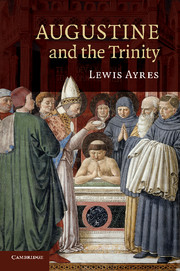Book contents
- Frontmatter
- Contents
- Acknowledgements
- List of abbreviations
- Introduction
- Part I Origins
- Part II Ascent
- Part III Into the mystery
- 7 Recommending the source
- 8 Essence from essence
- 9 Showing and seeing
- 10 Loving and being
- Part IV Memory, intellect and will
- Epilogue: Catching all three
- Bibliography
- Scripture index
- General index
- References
8 - Essence from essence
Published online by Cambridge University Press: 06 December 2010
- Frontmatter
- Contents
- Acknowledgements
- List of abbreviations
- Introduction
- Part I Origins
- Part II Ascent
- Part III Into the mystery
- 7 Recommending the source
- 8 Essence from essence
- 9 Showing and seeing
- 10 Loving and being
- Part IV Memory, intellect and will
- Epilogue: Catching all three
- Bibliography
- Scripture index
- General index
- References
Summary
This chapter and the next have the character of a ‘taking away’ and a ‘giving back’. In this chapter I argue that the tradition of reading De trinitate 5–7 as an account of ‘subsistent relations’ (albeit an inchoate one that awaits Thomas for its full actualization) misses Augustine's focus on questions of predication, and overly concretizes Augustine's inchoate hints about the substantial and immutable quality of relations between the divine three. In this respect these books of the De trinitate offer far less of a developed Trinitarian ontology than is frequently assumed. At the same time, however, I argue that these same books do describe some important and developed features of such an ontology that are usually missed. In particular, Augustine offers an account of the Father eternally giving rise to Son and Spirit from the Father's own substance under the conditions of divine simplicity, that rejects person and nature language as a knot of ideas that can found logically coherent discussion of the divine communion. And thus, Augustine's interpretation of the Nicene ‘God from God’ marks his theology as one of the most intriguing explorations of the creed's phrasing.
In Chapter 9, I continue this exercise in ‘giving back’, by suggesting that outside, but around and just after the time of writing De trinitate 5–7, Augustine does offer more positive and direct suggestions about the eternal relationships and intra-divine acts that constitute Father, Son and Spirit.
- Type
- Chapter
- Information
- Augustine and the Trinity , pp. 199 - 229Publisher: Cambridge University PressPrint publication year: 2010



